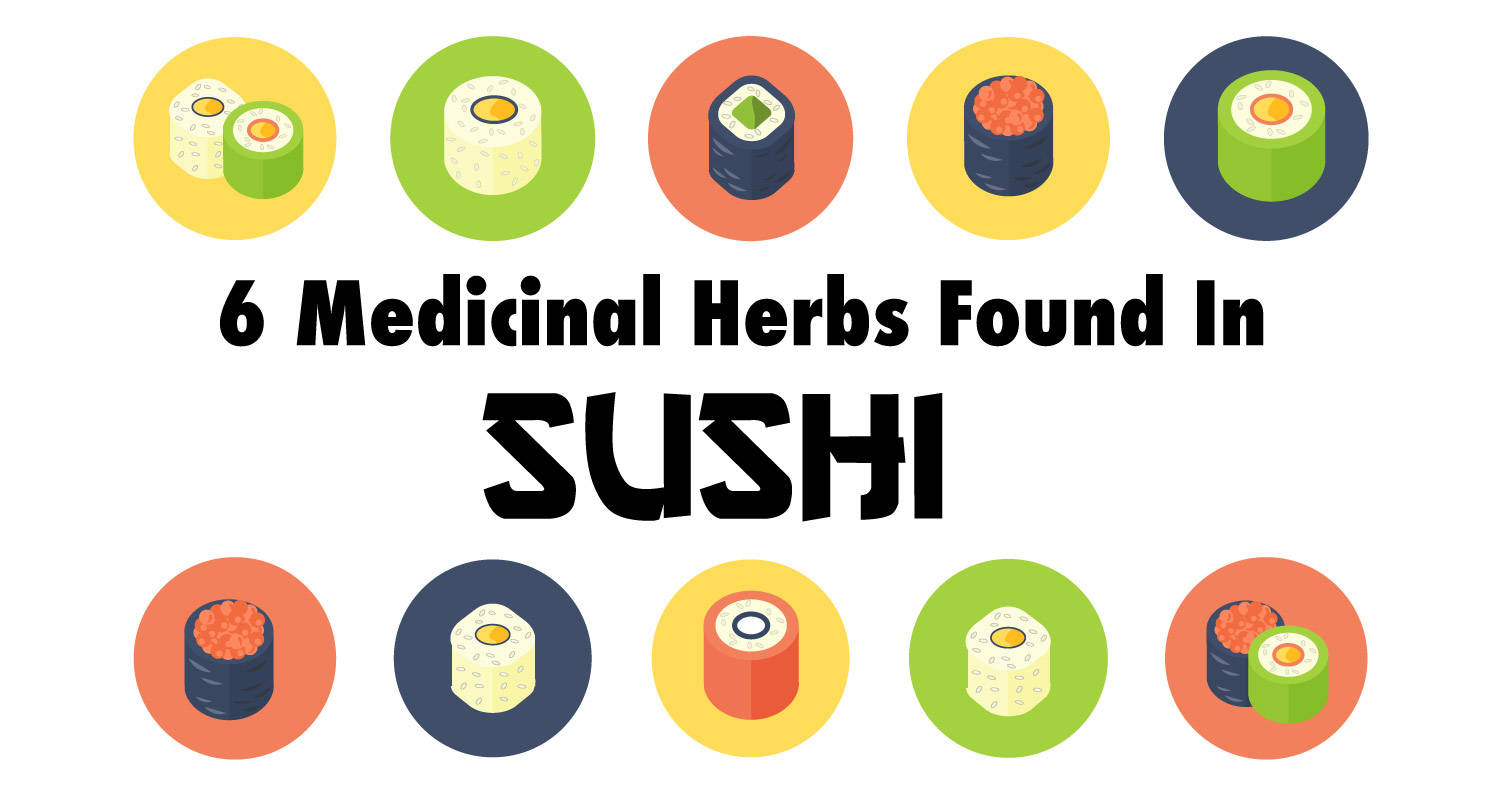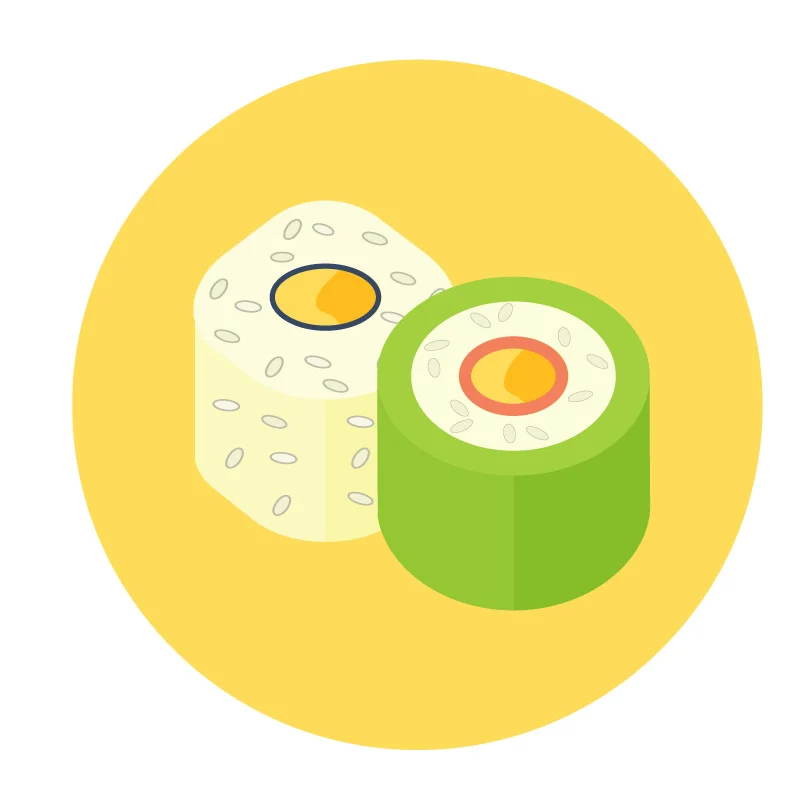Sushi combines art, flavour, and nutrition into one delicious package. This tradition has been around for over 1000 years, and has been steadily growing in popularity all over the world.
This well thought out food utilizes an advanced knowledge about nutrition and food combining. It mixes rice (a good source of carbohydrates), with fish and other seafood (a good source of fats and protein), as well as veggies. It ends up being quite a well rounded, and highly nutritious meal. Did you know that sushi also ingeniously takes into account what herbs it incorporates?
1. Wasabi
We are all familiar with that green spicy paste that often comes with sushi. Its pungent, and spicy flavour seems to head straight for the nostrils when eaten, clearing out our sinuses instantly! Wasabi is actually a root vegetable cultivated in rivers.
Wasabi Farming Usually Takes Place in a River. It is extremely hard to cultivate.
Wasabi contains various antioxidant compounds, as well as a rich supply of vitamins and minerals. Its medicinal value is impressive, and is considered anti-inflammatory, antimicrobial, anti-cancer, anticoagulant, and detoxifying. It has been used to treat conditions such as cardiovascular disease, arthritis, bacterial infection, preventing cavities, and to boost digestion.
2. Mitsuba
Mitsouba is a medicinal and culinary herb of Japanese origin, that is common in many Asian dishes. This herb contains a high level of vitamin and mineral content, and also offers medicinal value. It is used to treat cold and flu, fevers, haemorrhages (excessive bleeding), and to relieve stress. Its flavor is similar to parsley or celery.
3. Ginger
Ginger is by far one of the most well known of the herbal medicinal plants, and is also commonly used as a food flavoring as well. It is primarily used in the sushi setting in the form of Gari, which is a sweet, thinly sliced young ginger that has been "pickled" in sugar and vinegar. It is generally regarded as an essential element to the sushi meal, and is used to cleanse the palate between different flavors of sushi. It has the added benefit of its medicinal action on the digestive tract. It is very well known to produce both a soothing action to the intestinal tract, as well as antimicrobial actions. The warming sensation of ginger is also though to increase digestion, which helps to breakdown and absorb an especially large and dense sushi meal.
4. Rice Vinegar
The rice itself is nearly always mixed with some rice wine vinegar, and often sake as well. They do this for flavor, but it also has some medicinal actions as well. Rice wine vinegar is extremely useful for improving digestion due to the acetic acid. It works in much the same way as apple cider vinegar which has been going through somewhat of a fad recently for its health effects. Most of these effects are actually due to the acetic acid (vinegar), and rice wine vinegar is no different. It alkalizes the body, and improves the efficiency of digestion, which both eases the stomach, and improves digestion, meaning you will get more nutrients out of your sushi by the time it reaches the other end!
Rice wine vinegar is also extremely helpful for maintaining liver health, and has been suggested to be strong enough to reduce the risk of liver tumors! Rice wine vinegar has been suggested to be useful in lowering cholesterol as well, which directly influences heart health. This is an understandable argument because cholesterol is made in the liver, and through rice wine vinegars known effects on the liver it comes to no surprise that it has this ability as well. (Source).
5. Nori Seaweed
This is the seaweed used to make the sushi rolls themselves. Seaweed has the highest concentrations of iodine out of any other food in the world. This essential element is incredibly useful for combatting the negative effects of radiation, and is required for our thyroid to function. Our thyroid is responsible for metabolism and works to both keep us thin, and provide our body with energy. Therefore it is incredibly important to have a properly functioning thyroid, especially after a big meal of sushi!
On top of that, Nori contains relatively high amounts of vitamin B12, which is the main vitamin lacking in many vegan diets. This essential vitamin is important in all kinds of crucial processes within the body from blood production, to neurotransmitter production. needless to say, it is very important that we get adequate amounts of vitamin B12 no matter what diet you are on. Seaweed has been found to have enough of this vitamin to reverse B12 deficiencies in rats.
Nori has also been suggested to reduce cholesterol, lower the risk of coancer, and improve bone health.
6. Shiso (Perilla frutescens)
Shiso is a popular Japanese herb from the same family as mint. Its leaves are used commonly as a garnish, and as an addition to sushi. The leaves are considered a potent antioxidant, and provides significant effects after long term consumption on allergies and hay fever. It has also been shown to produce significant antibiotic and antiviral activity as well. Shiso has a huge range of uses, the most common ones being to alleviate nasea, as a flavor enhancer (mildly spicey, similar to cinnamon), allergies and stuffy nose, cold/flu, aleviate morning sickness, and treat indigestion.
The nutritional value of shiso is nothing to scoff at either, containing generous amounts of omega-3, omega-6, and omega-9 fatty acids. It also contains high amounts of calcium, potassium, iron, and vitamins A, B2, and C.
This herb is used very commonly in Japanese and other asian cultures, where its leaves, and seeds are both consumed regularly.
Article By:
Justin Cooke
The Sunlight Experiment



















